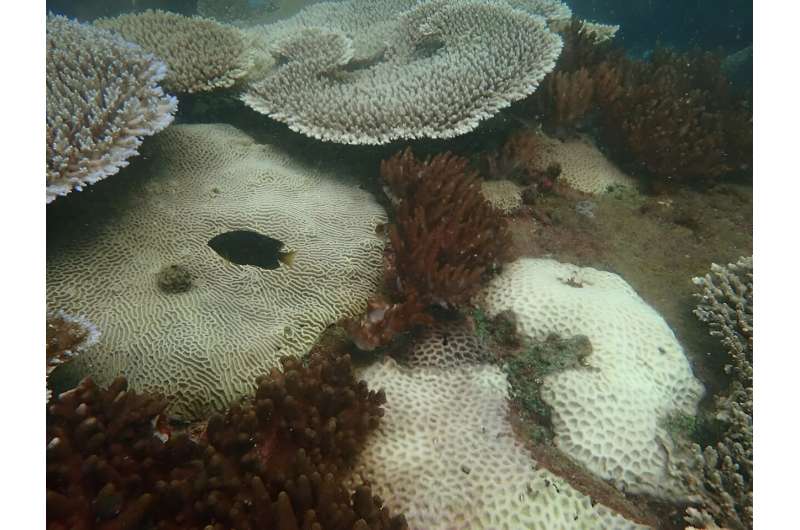This article has been reviewed according to Science X's editorial process and policies. Editors have highlighted the following attributes while ensuring the content's credibility:
fact-checked
trusted source
proofread
First reports of severe coral bleaching this summer as the Great Barrier Reef warms up

As ocean temperatures continue to warm over the Great Barrier Reef this summer, James Cook University scientists have reported areas of moderate to severe coral bleaching around the Keppel Islands offshore from Rockhampton.
The bleaching was observed during routine surveys as part of a 25-year program tracking changes in fish communities and coral reef habitats at 42 Great Barrier Reef islands. These islands are highly valued and frequented by tourists, recreational fishers, and local communities.
James Cook University's Centre for Tropical Water and Aquatic Ecosystem Research (TropWATER) scientist Dr. Maya Srinivasan said the water temperatures at the Keppel Islands were well above the summer average, reaching 29C in the water during multiple days of surveys.
"I have been working on these reefs for nearly 20 years, and I have never felt the water as warm as this," she said.
"Once we were in the water, we could instantly see parts of the reef that were completely white from severe bleaching. Some corals were already dying."
Heat stress is the primary cause of coral bleaching. While severely bleached corals will likely die if the water temperature remains higher than normal for too long, they can also recover if ocean temperatures stabilize.
The team surveyed 27 sites at the Keppel Islands, with most sites showing signs of bleaching and only deeper areas of reefs relatively unimpacted by heat stress.
"Although some corals were already dying, many of the corals could recover if the water cools in the coming weeks, and we did see the temperatures begin to drop towards the end of the trip."
The Keppel Islands is a highly visited island group in the Great Barrier Reef, used by tourists, locals, and recreational fishers. Decades of monitoring have shown coral reefs and fish communities at some reefs are resilient and have recovered from past bleaching events.
"We have seen fish abundance decline as coral cover declines in this region following past impacts like this. But we have also seen the recovery of coral and fish communities on many areas of the reef—there just needs to be enough time between impacts to allow this recovery to occur."
Dr. Srinivasan said that heat stress typically peaks in the summer months over the Great Barrier Reef. Should high temperatures persist, the likelihood of more widespread bleaching across other parts of the reef increases.
"Island reefs also face heightened vulnerability due to their inshore location, making them more susceptible to impacts like water quality issues, coral bleaching, and overfishing," she said.
"Given the high vulnerability of island reef habitats matched with their high use, it's important to have an understanding of the nuances of impacts and recovery—this will help managers adjust their management strategies."
The team will now survey reefs in the far northern Great Barrier Reef following extensive floods in January. Magnetic Island, near Townsville, and the Cumberland Islands, offshore from Mackay, will also be surveyed in the coming weeks.
The monitoring program includes more than 42 islands in eight key island locations from the far north to the southern Great Barrier Reef. The program also tracks the effectiveness of marine park zoning with survey sites in both no-take areas and areas open to fishing.
"Through rigorous monitoring, we aim to uncover insights into why certain reefs may exhibit slower recovery rates and why some fish populations might thrive on some reefs and not others."
"All this provides vital information for targeted intervention and management strategies."
Provided by James Cook University




















